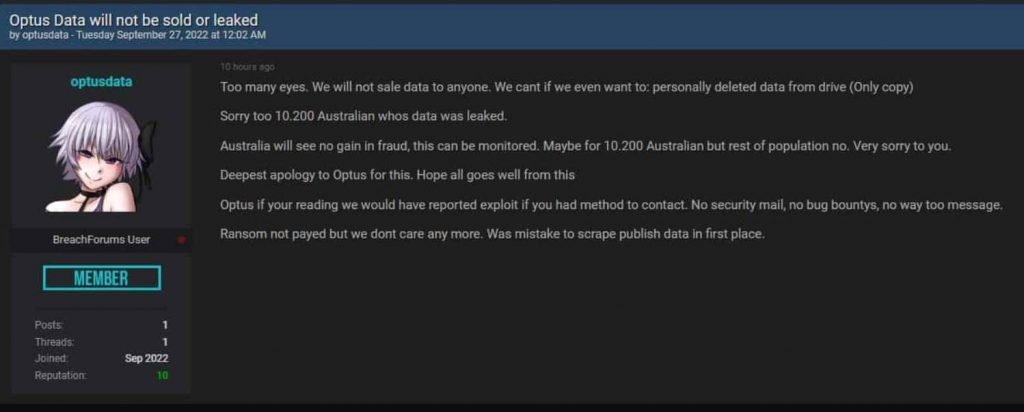A hacker who allegedly targeted Optus, Australia’s second-largest telecom company, and stole the personal information of millions of Australians, has posted more material online. In the past, the hacker demanded a ransom payment of around $1 million in return for client information. On Tuesday, the attacker changed his mind about this demand.
Names, email addresses, dates of birth, passport and driver’s license numbers, phone numbers, residences, Medicare numbers, and other personal information belonging to Optus users are among the stolen data. Over a dozen email addresses from the federal and state governments are also included. Four emails from the military department and one each from the Prime Minister’s office and the Cabinet were also included in the hacked material.
The data leak was attributed to Optus’ lax security, and the hacker lambasted the business for not having any system in place to disclose a vulnerability. Optus, on the other hand, asserts that a highly skilled attack was the cause of the breach.
It’s not known if the data was just accessed by the suspected Optus hacker or if it was visible to other people. To identify the attacker and the person who accessed the data, the FBI and the Australian federal police have worked together.
However, after providing the most recent batch of 10,000 documents, the hacker unexpectedly removed the extortion threat. The hacker also expressed his regret to the business by altering the first post on the data breach to indicate that the stolen material had been destroyed.

A lot of eyeballs. No one will ever purchase data from us. The amended message stated, “We can’t if we even want to: personally erased data from disk (Only copy).
The allegedly responsible Optus hacker expressed regret to the affected Australians.
“Australia will not benefit from fraud; it can be tracked. Perhaps for 10,200 Australians, but not for the majority of people. I’m very sorry.
200 entries made up the original Optus customer dataset that the accused attacker shared initially. These documents’ text file was posted on a data breach website by the hacker, who threatened to release 10,000 more records daily for the following four days if Optus didn’t agree to pay the demanded ransom in the cryptocurrency Monero. But now the hacker has changed his mind.

He is a well-known expert in mobile security and malware analysis. He studied Computer Science at NYU and started working as a cyber security analyst in 2003. He is actively working as an anti-malware expert. He also worked for security companies like Kaspersky Lab. His everyday job includes researching about new malware and cyber security incidents. Also he has deep level of knowledge in mobile security and mobile vulnerabilities.











